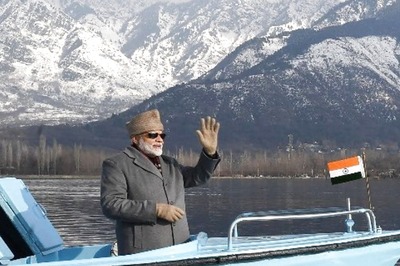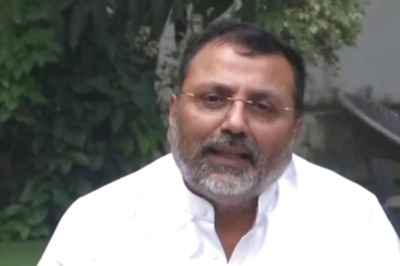
views
++++++++++++++++++++++++++India’s relations with its neighbours, with their ups and downs, are always a subject of internal debate. The regime change in Bangladesh has triggered a fresh one on how we handle our neighbourhood.
The argument is again being made in our foreign policy circles that India’s growth and the major role that it aspires to play internationally require that we have, and work for, friendly ties with our neighbours. It is being assumed that we can, with the right policies, create a friendly neighbourhood.
No doubt a friendly neighbourhood is an asset. Generally speaking, countries put the neighbouring countries in the first concentric circle of foreign policy priorities. Our policy of “Neighbourhood First” means this. A country with stable ties with neighbours is obviously less distracted by problems nearer home when acting on the international stage.
In theory, this is fine. In reality, however, a country is more likely to have more problems with neighbours than with distant countries, as neighbours impinge on each other much more and are likely to have more friction.
All the more so when a big country is surrounded by much smaller neighbours. In India’s case, not only is India far bigger than its neighbours, the neighbouring countries have a common border with India but not with each other, which adds to their sense of vulnerability to India’s size and power.
India’s neighbours are also connected to India ethnically, culturally, religiously, and, indeed, by civilisational roots. So as not to be overwhelmed by India they tend to emphasise their separate identity as independent states, with policies and approaches that make India’s task of handling them more complex.
What adds to the complexity is that despite the gap in size and power with India, the neighbours are prepared to threaten India’s security. Pakistan claims Indian territory, continues to internationalise its claims, does hostile propaganda against us constantly, and seeks to mobilise pan-Islamic sentiments against us, especially on the Kashmir issue. It has used terror as an instrument of state policy towards India for almost four decades. This is not to mention earlier military aggressions against India. Having acquired nuclear weapons, it has felt more emboldened to promote terrorism in India. It has not abandoned that policy completely even now.
Bangladesh, despite greater vulnerability to Indian power, has in the past given safe havens to anti-Indian insurgents, aggressively raised water-sharing issues, refused cooperation to control illegal migration into India, and pursued policies to deny us easier access to our northeast to impede our efforts to promote their development.
Nepal is ultra-sensitive about its sovereignty, has for long refused to cooperate with us in developing its water resources, nourishes grievances against us, and cultivates a political narrative of India’s interference in its internal affairs. The “India Out” campaign in the Maldives that brought President Mohamed Muizzu to power there with an agenda of diluting ties with India is another example of our neighbours not being deterred from challenging India.
The smaller neighbours of a big country would naturally look for a big external power to balance the weight of their large neighbour. To counter India’s weight in the subcontinent, all our neighbours, barring Bhutan, have long encouraged China’s role in the region.
They played the China card against us even when China was not as strong and resourceful as it is today. China now has a much more active policy of competing with India for influence in the subcontinent. It has sought to neutralise India strategically by sharing nuclear and missile technology with Pakistan. It is the biggest defence partner of Pakistan and also Bangladesh. Nepal has forged military ties with China, and so has Muizzu in Maldives. Sri Lanka has aided, and is aiding, China’s maritime strategy in the Indian Ocean by giving it port construction contracts and opening its ports to visits by Chinese research vessels and submarines, which is vital for sustaining China’s naval presence in the Indian Ocean.
India has to live with these realities. A “Neighbourhood First” policy of India is not reciprocated by a “Neighbourhood First” policy of our neighbours, barring Bhutan. In the case of Bhutan too, China is following an insidious policy of wooing and bullying Bhutan at the same time, which is placing some pressure on us in managing our essentially very friendly ties with that country.
The fact is that all big countries have problems with their neighbours and we are not an exception. China’s relations with its neighbours are full of tensions because of history and contemporary developments. Some of them, such as Japan, South Korea and the Philippines, are US allies. The US military is present in the region to counter China’s expansionism. There is an effort to enhance deterrence against China in other ways, such as promoting the Indo-Pacific concept, the Quad and AUKUS.
Russia has huge problems in managing its neighbourhood. NATO has progressively extended towards Russia’s borders. The conflicts in Georgia and now in Ukraine flow from this. In the Central Asian states, once part of the Soviet Union, Russia has to contend with increasing Chinese influence, as also the US presence in some of these states.
The US has long sought to control its neighbourhood, without lasting success. It has had to intervene militarily and in other ways to maintain its hegemony. Cuba, Venezuela and Nicaragua are some examples of tiny countries that have resisted US power.
The point in noting all this is that the US remains a preeminent global power despite its neighbourhood failures. China has emerged as the world’s biggest manufacturing power and a peer competitor of the US even in the area of technology, despite its unstable neighbourhood. Russia is recovering as a great power despite its neighbourhood challenges.
In India’s case, the opening up of its economy, the 1998 nuclear tests that changed the equation with the US and led to the nuclear deal, its steady economic rise to the point of becoming the fifth largest economy in the world and the third largest by the end of this decade has occurred during a phase when it was wracked by Pakistan-sponsored terrorism against us, China’s de-stabilising entry into our region, the virtual collapse of SAARC, etc. No doubt, a more supportive and friendly neighbourhood would have been helpful internationally, but the success of our G20 presidency and our role as the voice of the Global South show that even without it India’s quest to be a leading power and have more say in international governance continues unabated.
This does not mean that India should in any way give up efforts to deepen its commitment to the closest possible ties with our neighbours. Pakistan will remain an exception as it is hard-wired to be inimical to India. We will have to wait and watch whether the new political forces in Bangladesh will want to reverse some of the vital gains both sides have made under Sheikh Hasina’s leadership or whether the realities on the ground will eventually dictate a more mature and realistic approach as in the case of President Muizzu.
We have to adjust our strategy to the reality of China’s challenge to our interests in our region. Our neighbours will continue to play the China card against us. We are ourselves trading with China, and this undercuts any advice we may give to our neighbours to limit China’s presence in the subcontinent. China’s trade and development activities in the region inevitably have security implications for us, given the state of our relations with China. The leaders of our neighbouring countries should ideally be sensitive on their own to our concerns and pursue responsible policies, but as some of them are ideologically oriented or play internal politics to achieve power, India-baiting becomes a political option for them. We must of course underline to them our red lines, as friends.
Our longer-term approach has to be to continue to help our neighbours develop, create connectivity links, expand levels of bilateral trade, and people-to-people contacts. As our own economy grows, we will have more resources to devote to achieve our objective to increase the stakes of our neighbours in good relations with us. Our neighbours will want to benefit from what we do, but will also resist a tight embrace to preserve their version of “strategic autonomy”.
Kanwal Sibal is a former Indian Foreign Secretary. He was India’s Ambassador to Turkey, Egypt, France and Russia. Views expressed in the above piece are personal and solely those of the author. They do not necessarily reflect News18’s views.




















Comments
0 comment